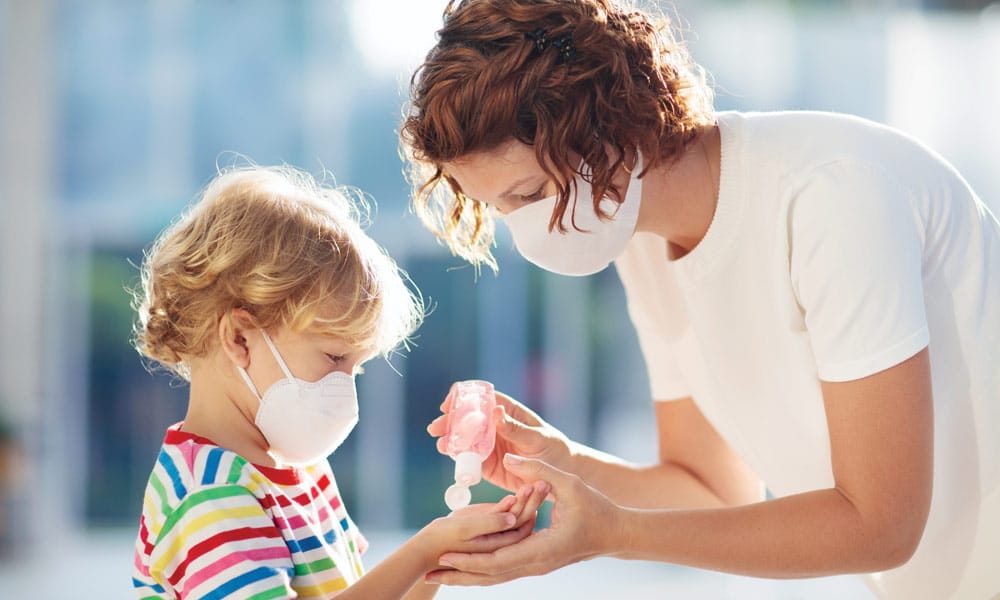Concerns grow over the prevalence of COVID-19 in the community as we head into the flu and RSV seasons this fall.
A rumor that seems to be gaining more ground these days is that COVID-19 will interact with influenza and respiratory syncytial virus (RSV) to create a “super-virus” in the coming months, further decimating the health of Americans and crippling the healthcare industry.
The truth is COVID-19 will interact with the flu and RSV, but the three contagious respiratory viruses will not evolve into a “super-virus.” Each is a completely different strain that cannot merge with the other. Still, there are concerns about them being active in the community at the same time.
Flu, RSV Season
What’s commonly referred to as “flu season” is when the influenza, or flu, virus is most active, typically the fall and winter months of October to March. Cases tend to peak during the December to February window. RSV season typically occurs from September to March. Like the flu, the number of positive RSV cases tend to peak December through February.
What’s concerning this year as we inch closer to the flu and RSV seasons is this: The flu and RSV often bring an increase in hospitalizations of various ages due to dehydration, high fever and other complications caused by the individual viruses. Add to that an already over-burdened hospital system throughout the United States continuing to struggle to keep pace with surging COVID-19 cases, and you can see why healthcare professionals are concerned about the coming months.
Now is the time for us to take action and limit the spread of COVID-19, or “flatten the curve,” as many top health professionals are saying. Doing so will move us closer to an end to this ongoing pandemic and have the added benefit of freeing up much needed hospital space for the coming flu and RSV seasons. In addition, hospital space will be available for people whose surgeries and treatment for other ailments that require hospitalization have been delayed by the COVID-19 pandemic.
Who’s at Risk?
Who’s most at risk in the coming months? Honestly, we don’t know. We’ve never had a season with the flu, RSV and COVID-19 infecting people at the same time. We don’t know how the human body infected with influenza or RSV will react when impacted by COVID-19, and vice-versa. We do know that some strains of the flu increase the risk of a secondary bacterial infection. But, there’s no data to show if the same will happen with COVID-19.
This fall and winter providers will be testing for the flu, RSV and other ailments as they’ve done in previous years. In addition, this season COVID-19 will be among the things we’re testing for when a person comes in exhibiting noted symptoms. Nearly all providers will have rapid turnaround tests for the flu and RSV, with results in as little as 15 minutes. However, rapid testing for COVID-19 may not be as widespread because of the availability of rapid tests nationwide.
School & Daycare Dilemma
The return to school and daycare continues to be heatedly debated. When will it be safe? How do I know my child won’t contract COVID-19 at school or daycare and bring it into our home? These are really good questions. Honestly, it comes down to this: You should decide what’s best for your individual situation. I can’t tell you how to feel or which would be the better option – send them or keep them home. No one knows your home and family health dynamics better than you. Assess your own risk tolerance and let that guide your decision.
Still, let’s be reasonable. If you’re sick, don’t go to work. Don’t go to the grocery store, pharmacy or other public space. If you’re child is sick, keep them home. The power to protect your family and your community is in your hands.
Flattening the Curve
You’ve likely heard it before many times – Mask up. Wash up. Practice social distancing. Healthcare providers continue saying it because these are the fundamental keys to not only keeping you and your loved ones safe from COVID-19. Following these simple steps is likely to keep you safe from the flu, RSV and other viruses, bacterial infections and other ailments out and about in our communities. Other tips to remember:
- If you test positive or exhibit symptoms, self-isolate to minimize exposure to your loved ones. You can have no or the most subtle of symptoms and still spread the virus or bacterial infection.
- Get vaccinated for influenza and RSV. If you’ve avoided getting the flu vaccine before or vaccinating your little one against RSV, it’s never been more important to reconsider.
Find a doctor who can address your health concerns today.
— Dr. Michael Bolton is a pediatric infectious diseases specialist with Our Lady of the Lake Children’s Health. Learn more at ololchildrens.org.




